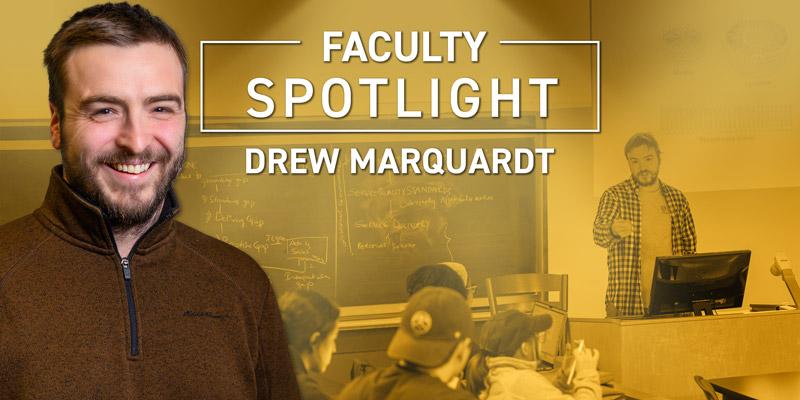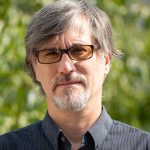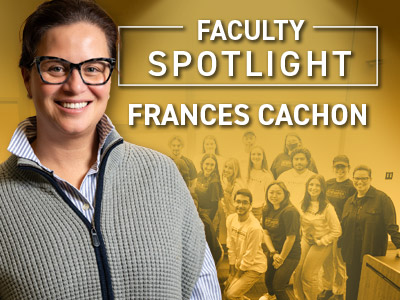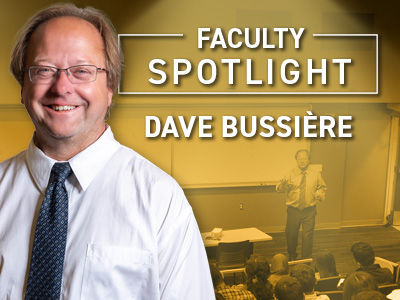A Change in Trajectory
Drew Marquardt’s career plans always revolved around getting back home which is not an easy endeavour in the field of science.
Marquardt is from the small town of Palmer Rapids in Renfrew County just outside Algonquin Park. He always loved science and his parents helped encourage this. He remembers his dad taking him to on a tour of the relatively nearby Chalk River Labs (now Canadian Nuclear Labs) when he was a kid. “We walked on top of the reactor. We got to go into the hot cells. I went places that people that work there now never get to visit because of the post 9-11 security changes.”
His great grandfather started a water well drilling business, which was taken over by his grandfather, and then his father. He worked for the family business in the summers and had the option of continuing in their footsteps, but his parents encouraged him to go to university to have an opportunity they didn’t have.
Marquardt went to Brock University because it had a program that allowed him to get a science and teaching degree concurrently. His goal was to become a science teacher when he finished since he said he thought it would be easier for him to get a job when he eventually came back home. He decided to major in Chemistry because he said it is considered a central science that allows flexibility into other areas of science. “With chemistry, you’re just dangerous enough that you can dabble in physics, but all of biology functions on the principles in chemistry, so you could go into biology if you had to.”
However, a second-year physics course changed the trajectory of his life. “The instructor, as we all do, talks about their research. He said, ‘I do my research in Chalk River’. I said, ‘well, I know where that is.’”
After Class Marquardt approached the prof, Thad Harroun, and asked him if he needed help with research up there since that was home for him. The prof said sure, and Marquardt dropped out of the concurrent degree program and started a minor in Physics. “I started picking up courses in math and physics wherever I could. I had to take a few undergraduate courses as a graduate student to make sure I had the background I needed. It was manageable but it wasn’t easy.”
Once he finished his undergrad, his goal became to work at Chalk River Labs as an instrument scientist, so he did his PhD in Physics supervised by Harroun applying neutron scattering to the study of model cell membranes. He spent a lot of his PhD working at Chalk River Labs, but his career trajectory changed again when Chalk River announced it would be shutting down their reactor.
Marquardt ended up doing his postdoc in Graz, Austria working in a lab focused on the applications of X-rays on model membranes, bringing a novel expertise on neutrons to the group. By this time, Harroun had become the president of the Canadian Institute for Neutron Scattering, a position Marquardt now holds. Eventually he ended up working on a project that was collaborating with a team at Oak Ridge National Laboratory in Oak Ridge, Tennessee, but found the time difference a little frustrating. “If I needed to ask or share something with the collaborator there, it was like a day to have a conversation”. He asked if he could move there and was given the go ahead spending several months living in Oak Ridge.
However, he wanted to get back to Ontario, so when he saw a job posting at the University of Windsor in the Department of Chemistry and Biochemistry, he applied. Even though he had a PhD in physics, his degree in chemistry helped him successfully get the job.
Teaching Post Covid
Currently Marquardt is Acting Head of the Department of Chemistry and Biochemistry and teaches one course. He started off teaching a large introductory biochemistry course, along with a scattering of higher year and grad courses for a few years, before taking on the role.
Marquardt said he prefers some level of interaction with students as opposed to getting up in front of class and doing all the talking. One practice he said he has used is having a molecule of the day on the screen as students filtered in for his introductory course. “I’d have a drug, or some sort of biomolecule, maybe a vitamin, up on screen as people came in. They’d look at it and then once there was enough people in the room, we’d start talking about what it was and why I thought it was interesting. Some people would have heard of it, and they’d have interesting stories to share. It went a long way.” He said each class is different and he has to figure out the best approach that works to engage students. “You have to be adaptive. I try to do my best to cater to what the students seem to respond to the best and then I’ll stick with that for the rest of the semester.”
He also likes to engage in casual conversation with the classroom, but things have changed since Covid. During the first five minutes of class there is no point in starting since students are still trickling in, he said, so he will generally ask the class during this time if they had learned anything interesting since they last met. “Historically, this would generate conversation, but the level of engagement has dropped. Students are not as talkative as they were compared to pre-Covid.”
He said others have noticed the same thing and he hopes things will hopefully go back to how they were. “I’m still learning what the best way to get through post-Covid. It might take a whole cohort of everything being back in-person before you get the same level of engagement from the class. I hope it comes back because that was half the fun. The students are what makes this job fun.”
Once he is done being Acting Head, he believes he will go back to teaching the introductory course, considering it a good place to recruit future grad students. “Two of my four PhD students came out of that introductory class. When they were in second year they kept in touch and then when they decided to get interested in research, I made at least a good enough of an impression that they wanted to work with me.” The best part of his job, he said, is supervising and interacting with grad students. “You get the right students. They work hard. They’re funny. They’re enthusiastic. You sit and you can talk science hours and hours. They genuinely enjoy it at the same level I do.”
Grading and Assessment
Marquardt isn’t a fan of grades or grading. He sees it as a necessary evil but does wonder if there is a better way. “A lot of students come in and they are so grade focused that school’s not fun for them, learning’s not fun for them, because they’re so afraid of not getting a good grade.” He said the pressure of getting good grades can be counter-productive since students retain information better and are more successful when there is less anxiety around getting the best grade possible. “This drive for the grades it’s not about understanding the material, it’s about writing that exam and getting a good grade.”
He does acknowledge that there doesn’t seem to be an easy solution. “I recognize that there are things that students will face that are grade-related, and those that deserve a higher grade than others should get it.”
However, he is a firm believer in assessment. “Assessment is different from grades. Assessments, in my opinion, help students see where they’re deficient in understanding and help them get better at the subject matter. That’s why tests and assessments are valuable because a student should look at them and be self-reflective.”
It’s not possible to cater to every type of learning style, he said, so he greatly encourages students who do not understand the material to ask questions in class, since he knows if a student has a question, then others may have the same one as well. As much as possible, he also tries to avoid material that requires memorization, and drills into the students that they need to have a working knowledge and understanding of the core concepts.
In addition, he tries to relay the importance of the material. “Some students question why we have to learn certain things and say it’s completely irrelevant, or they will never use that knowledge, but I point out to them that this is being used in this biotech job right now. You give them a reason to learn something that they didn’t think was important and tell them they’ll benefit in the long term for knowing it.”
Another thing he said he thinks students would benefit from long term is learning certain skills, such as public speaking. “I try to incorporate the soft skills as much as possible, in particular presenting and public speaking. Students do not get enough of that in their undergrad, at least their undergrads in science. How do you get a job if you can’t speak to somebody or speak to a crowd? What I end up seeing is that our graduate students lack a lot of presentation skills when they get to grad school and that has to be developed there, when really it should be something they should have always been working on.”
Overall, Marquardt tries to make the learning fun. “I have cards from students where they thank me for help, changing the direction they were going, or whatever, but that’s part of the job. I try to make the learning fun. I’m proud if they walk out with a smile; they should enjoy it.”
Marquardt still finds himself heavily involved in neutrons. As president of the Canadian Institute for Neutron Scattering, he, along with others, is in the middle of writing a long-range plan for the neutron scattering community. He was on the steering committee for Neutrons Canada, and was recently in the US helping to run a workshop to put a report to Congress to build a new research reactor. “Neutrons actually take up a very large portion of my life, and occasionally it spills into my teaching as well.”
He may yet realize his plan of returning home. “That’s my retirement goal. Go be an executive at the Canadian Nuclear Laboratories in the last five years of my career. Move back home. I’ve been here for seven years, and I like it, but the Ottawa Valley is home.”
Peter brings extensive expertise in multimedia to support CTL programs, website design, and special events. With around 25 years of experience in graphic and web design, he brings a wealth of knowledge to the table. He is a graduate of Print Journalism and Digital Media from Conestoga College, and and Communication, Media and Film from the University of Windsor.










Comments